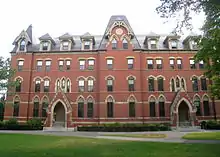Yield protection
Yield protection (commonly referred to as Tufts syndrome) is an admissions practice where a university or academic institution rejects or wait-lists highly qualified students on the grounds that such students are bound to be accepted by more prestigious universities or programs.[2] The purpose of the practice is to help increase the yield rates (amount of enrollments compared to acceptances) of colleges and universities.

However, an alternate view holds that yield protection is a myth propagated by college students who failed to gain admission to elite universities; this view proposes that weak or negative subjective factors in an application may contribute to a rejection in spite of the applicant's strong qualifications.[3]
Yield rate refers to the proportion of students who matriculate (i.e. accept an admissions offer and attend the college) after acceptance to a college.[4]
References
- Pak, Jilliann (2015-05-01). "Admissions fact or fiction: yield protection (aka tufts syndrome)". The Prospect. Retrieved 2016-04-19.
- "Beware the Tufts Syndrome". College Confidential. Retrieved 23 March 2015.
- Zearfoss, Sarah (2010-03-01). "Yield Protection: myth or reality? Or a little of both?". University of Michigan Law School. University of Michigan. Retrieved 2016-04-19.
- What Is "Yield" in the College Admissions Process?